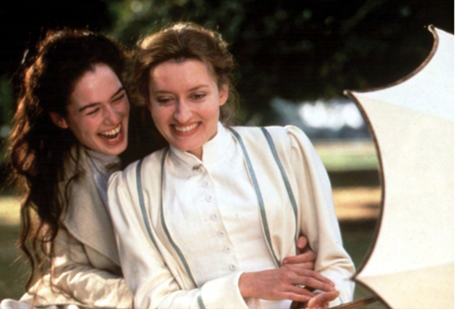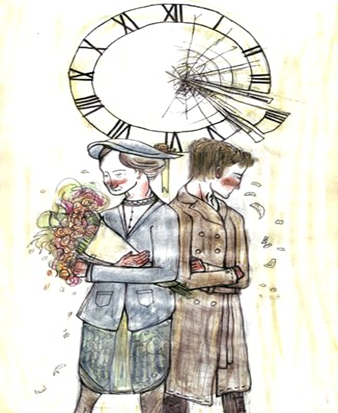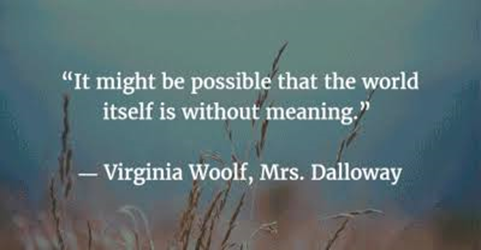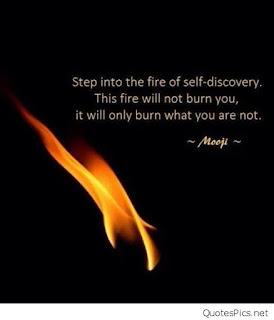Theme of Idealism and Humanism in Virginia Woolf's Novel Mrs. Dalloway
Virginia Woolf was considered as one of the major English authors of the 20th century. She was a forerunner in exploring the stream of consciousness as a narrative technique. “Mrs. Dalloway” is considered as one of her most renowned works of her career. Published on 14 May, 1925, “Mrs. Dalloway” focuses on the events of a particular day in the life of an upper-class Londoner named Clarissa Dalloway. The narrative of "Mrs. Dalloway" is devoid of any sense of continuity. The majority of the novel takes place in the mind of the protagonist. The novel deals with the idea of time in relation to personal experiences through a number of interconnected stories, particularly that of Mrs. Dalloway, who is preparing to host a party at her home, and the story of a victim of the horrors of the World War I, Septimus Warren Smith, who is afflicted with Post Traumatic Stress Disorder (PTSD). Mrs. Dalloway is critical of the conservatism and traditions of the upper classes of the time, while Septimus is a victim of the tragedy of the "lost generation" following World War I.
Peter Walsh is also one of the idealists in the text. Through Peter's male conventional approach towards women, Woolf indicates the traditional female struggles for personal identity. Peter called Clarissa ''a perfect hostess'' by which he insinuated that Clarissa's life has nothing to show except frivolity, deception, insincerity and artificiality. He held the societal belief that women exist solely for the purpose of marriage persists. He felt personally victimized by Clarissa's refusal to his marriage proposal and questioned, ''Why make him think of it again? Why make him suffer, when she had tortured him so infernally? why?'' (MD). He maintained the notion that the identity of a female lay merely in a marital relationship with patriarchal dominance.
Humanism is a term applied to various beliefs, methods and philosophies that emphasize a central human world. It is the belief that people can live by using their intellect and reason instead of depending on God or religion. Virginia Woolf inherited the humanism of her parents and did not believe in God or the afterlife, but emphasized the superiority of the present moment. Woolf’s method of consciousness describes the soul as a “sacred space” or “refuge.” Woolf’s references to Christ in the characters of Septimius Smith and Clarissa Dalloway suggest a desire to find answers to human pain in a “godless” world. Clarissa Dalloway has "atheistic religion of doing for the sake of goodness". She has come to terms with the absence of God, but does not want to live her life entirely according to worldly conditions. The novel reenacts her search for a spiritual alternative to conventional belief on a particular day in June of 1923, because she is preparing to host a party. Accepting that in death she stops completely, Clarissa expected that her afterlife would be in the memories of others, “laid out like a mist between the people she knew best, who lifted her on their branches as she had seen the trees lift the mist.” (MD)
When a falling tree killed her sister Sylvia, Clarissa snapped, Peter recalls. And then, “she thought there were no Gods, no one was to blame; and so she evolved this atheist’s religion of doing good for the sake of goodness.” (MD)
After buying the flowers, Clarissa retires to her home and, thinking about life and God, firmly declares that “not for a moment did she believe in God." This may be the opinion of a non-believer or a woman who desires for Good in vulnerable moments. Peter Walsh offers his own interpretation of the concept.
“Possibly she said to herself,… as the whole thing is a bad joke, let us, at any rate, do our part; mitigate the sufferings of our fellow prisoners…decorate the dungeon with flowers and air-cushions, be as descent as we possibly can. Those ruffins, the Gods, shan’t have it all their own way, - her notion being that the Gods, who never lost a chance of hurting, thwarting and spoiling human lives were seriously put out if, all the same you behaved like a lady”
Septimus Warren Smith, a shell-shocked war veteran longs for unity, integrity and meaning in his life. The battle takes place mainly in his tortured mind. Even Christianity could not protect him from the sufferings of human life. Therefore, he resorts to committing suicide, which is debarred in Christian teachings. However, killing oneself is a true and bold challenge of modern doctrines. The importance of Mrs. Dalloway's thoughts is evident:
“Death was defiance. Death was an attempt to communicate; people feeling the impossibility of reaching the center which, mystically, evaded them; closeness drew apart; rapture faded, one was alone. There was an embrace in death.”
Woolf's critique of idealism is not aimed at a specific school of thought, nor is it directed against any form of social or political oppression. Rather, it is directed against a pervasive ideological system that perpetuates a system of perceived imperatives that are only apparent to the public at large due to a lack of disciplined adaptation. Despite the fact that many idealists in the writings of “Mrs. Dalloway” do not share the same outlook on order, all of them advocate the imposition of will rather than what is perceived as the obstinacy of material existence. This novel is written with the inner thoughts of the characters in mind. Virginia Woolf indirectly and explicitly expresses Mrs. Dalloway's anti-religion using various religious imagery of events, objects, and characters. The central theme of this novel is Christianity's grave failure to defend the unity of mankind. The traditional religious figures that appear throughout the novel expose the reader to the novel's fundamental themes: the collapse of modern society, the collapse of the individual within society, and the individual within himself.
References
Concepts of Identity in Virginia Woolf's "Mrs. Dalloway". A Comparison of the Personal and Public Identity Regarding Women during the Victorian Time (grin.com)
· The
Problem of Female Identity in Virginia Woolf's Mrs. Dalloway (edubirdie.com)
· Woolf
and realism (Cambridge.org)
· Mrs.
Dalloway (litcharts.com)
· Mrs.
Dalloway and time (wordpress.com)
· Human
relationships in Virginia Woolf’s Mrs. Dalloway by Barbora Lessova (University
in Prague)
· Private
Religion, Public Mourning, and Mrs. Dalloway by Elyse Grahams and Pericles
Lewis (Yale University)
· Religious belief in a secular age:
Literary modernism and Virginia Woolf's Mrs.
Dalloway (jstor.org)
· Mrs. Dalloway (enotes.com)
· A World Without Meaning: “Mrs. Dalloway”
(theimaginativeconservative.org)
· Religious
Thoughts through Imagery in Mrs. Dalloway by Lika Tian and Hongmin Li
· Humanism
in English Literature (learnershub24*7.com)
· What
is idealism in literature (quora.com)












👌👌👌🌸🌸🌸
ReplyDelete